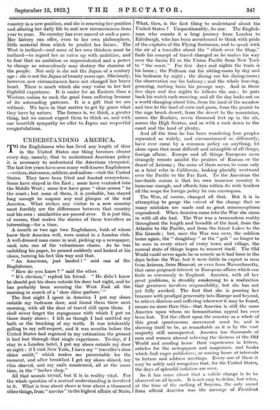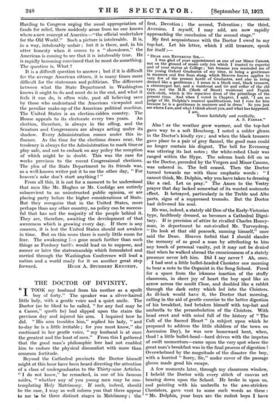UNDERSTANDING AMERICA.
TIO the Englishman who has lived any length of time in. the United States one thing becomes clearer every day, namely, that to understand American policy it is necessary to understand the American viewpoint. The last few years have seen many well-known Englishmen —writers, statesmen, soldiers, and sailors—visit the United States. They have been feted and feasted everywhere. Some have stayed in the East ; some have ventured into the Middle West ; some few have gone "clear across" to the coast; but none of. them, it is probable, has stayed long enough to acquire any real glimpse of the real America. What strikes any visitor to a new country most forcibly are the differences between that country and his own : similarities are passed over. It is just this, of course, that makes the diaries of these travellers so interesting—for a time.
A month or two ago two Englishmen, both of whom knew their America well, were seated in a London club. A well-dressed man came in and, picking up a newspaper, sank into one of the voluminous chairs. As he was unfolding his paper, he paused suddenly and looked at his shoes, turning his feet this way and that.
"An American, just landed 1" said one of the
Englishmen.
"How do you know ? " said the other.
"It's obvious," replied his friend. "He didn't know he should put his shoes outside his door last night, and he has probably been scouring the West End all the morning in search of a shoe shine parlour.'" The first night I spent in America I put my shoes outside my bedroom door, and found them there next morning, with all the dust of travel still upon them. I shall never forget the repugnance with which I put on those dusty shoes : I felt as though I had omitted my bath. or the brushing of my teeth. It was intolerably galling to my self-respect, and it was months before the United States had regained in my estimation the ground it had lost through that single experience. To-day, if I stay in a London hotel, I put my shoes outside my door at night : if I visit New York, I have my "traveller's shoe shine outfit," which makes me presentable for the moment, and after breakfast I get my shoes shined, my chin shaved, and my nails manicured, all at the same time, in the "barber shop."
All, that sounds trivial, but it is in reality vital. For the whole question of a mutual understanding is involved in it. What is true about shoes is true about a thousand other things, &Om " movies " to the highest affairs of State. What, then, is the first thing to understand about the United States ? Unquestionably, its size. The English- man who counts it a long journey from London to. Edinburgh, who has been accustomed to think with pride of the exploits of the Flying Scotsman, and to speak with the air of a traveller about the "climb over the Shap,". finds his concept of travel changed as he makes his way over the Santa Fe or the Union Pacific from New York to "the coast." For five days and nights the train is his home ; the Pullman car his sitting-room by day and his bedroom by night ; the dining car his dining-room; the observation car his balcony; and the whole heaving, groaning, rushing train his passage way. And in those five days and five nights he follows the sun ; he puts back his watch each morning, and all the day looks out on a world changing about him, from the land of the meadow and tree to the land of corn and grain, from the prairie to the sage brush desert, from the desert to the mountains, across the Rockies, seven thousand feet up in the air, across the High Sierras, and so with a rush down to the coast and the land of plenty.
And all the time he has been wondering how peoples separated so widely, and circumstanced so differently, have ever come by a common policy on anything, let alone upon that most difficult and intangible of all things, foreign affairs. Europe and all things European seem strangely remote amidst the prairies of Kansas or the desert of Arizona ; the noise of them seems to come only as a faint echo in California, looking placidly westward over the Pacific to the Far East. To the American the inevitable axiom is that his own immense country is immense enough, and affords him within its wide borders all the scope for foreign policy he can encompass.
The War, of course, changed all that. But it is in attempting to gauge the extent of the change that so many mistakes are made and so great misconceptions. engendered. When America came into the War she came in with all she had. The War was a tremendous reality throughout the length and breadth of the land, from the Atlantic to the Pacific, and from the Great Lakes to the Rio Grande ; but, once the War was over, the soldiers. home again, the " doughboy " or the "gob "no longer to be seen in every street of every town and village, the, normal state of things began to reassert itself. The Old World could never again be so remote as it had been in the. days before the War, but it were futile to expect in men from Arizona, from Missouri, or even from Massachusetts,_ that same poignant interest in European affairs which one finds so commonly in England. America, with all her great problems, is steadily awakening to a realization that greatness involves responsibility, but she has not yet fully awaked. The fact that she is pouring her treasure with prodigal generosity into Europe and beyond, to relieve distress and suffering wherever it may be found, means no more than this—that America is still the same America upon whom no humanitarian appeal has ever been lost. Yet the effect upon the country as a whole of this great spontaneous movement must be, and is showing itself to be, as remarkable as it is by the vast majority still unsuspected. America has thousands of men and women abroad relieving the distress of the Old World and sending home their experiences in letters, articles for the newspapers and magazines, and books which find eager publishers; or coming home at intervals to lecture and address meetings. Every one of these it may be safely said recognizes that, for the United States, the days of splendid isolation are over.
So it has come about that a subtle change is to be observed on all hands. It is not easy to define, but when, at the time of the sacking of Smyrna, the only sound from official America was the message of President Harding to Congress urging the usual appropriation of funds for relief, there suddenly arose from no one knows where a new concept of America—" the official undertaker for the Old World." Such a picture is intolerable. It is, in a way, intolerably unfair ; but it is there, and, in his utter honesty when it comes to a "showdown," the American is coming to see that it is intolerably true. He is rapidly becoming convinced that he must do something. The question is, What ? It is a difficult question to answer ; but if it is difficult for the average American citizen, it is many times more difficult for the statesman and politician. The difference between what the State Department in Washington knows it ought to do and must do in the end, and what it feels it can do, is often wide, past all believing save by those who understand the American viewpoint and the peculiar make-up of the American political machine. The United States is an election-ridden country. The House appeals to its electorate every two years. An election, therefore, is always in the offing, and the Senators and Congressmen are always acting under its shadow. Every Administration comes under this in- fluence. As the time for the elections draws near, the tendency is always for the Administration to mark time or play safe, and not to embark on any policy the reception of which might be in doubt. This was the case for weeks previous to the recent Congressional elections. The plea of the State Department to its friends was, as a well-known writer put it to me the other day, "For heaven's sake don't start anything ! "
From all this, it is not for a moment to be understood that men like Mr. Hughes or Mr. Coolidge are entirely subservient to an uninstructed public opinion, or are placing party before the higher considerations of State. But they recognize that in the United States, more perhaps than any other country, no policy can be success- ful that has not the majority of the people behind it. They are, therefore, awaiting the development of that awareness which is growing every day. If there is any concern, it is lest the United States should not awaken in time. But on this score there is surely little room for fear. The awakening 1.v gone much further than such things as Fordney tariffs would lead us to suppose, and sooner or later the statesmanship which formulated and carried through the Washington Conference will lead a nation and a world ready for it on another great step forward. Huott A. STUDDERT KENNEDY.



































 Previous page
Previous page